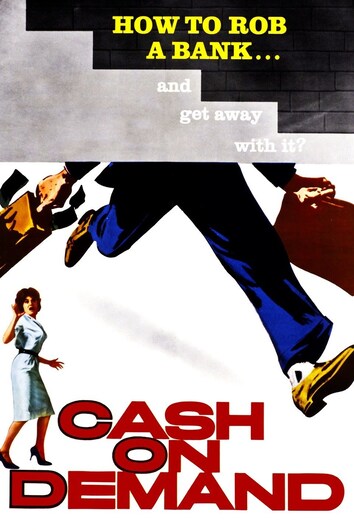|
By Michael Seymour Blake If the foundation of your story is strong, you don’t need any frills. Hell, you hardly need a budget. This Christmasy Hammer crime movie is based on The Gold Inside, a 1960 Theatre 70 episode written by Jacques Gillies. Reprising their roles are André Morell and Richard Vernon as Colonel Gore Hepburn and Pearson. Quentin Lawrence directs both versions, while David T. Chantler and Lewis Greifer provide the lively screenplay. It’s a thrilling chamber play-esque heist film, but holiday charm and dynamic chemistry between the leads make it one of my favorite yuletide watches. Peter Cushing plays Harry Fordyce, a flinty bank manager whose primary concerns in life seem to be pristine pen nibs, smudge-free plaques, and a flawless adherence to the rules. He keeps his emotions locked up in an impenetrable vault. You get the feeling he’d be thrilled if he could replace his employees with emotionless robots. Robots don’t decorate their desks with Christmas cards (so undignified), and they wouldn’t steal from the business either (like Fordyce absurdly accuses his longtime clerk, Pearson, of). Two days before Christmas, a suave bigshot from the insurance company named Colonel Gore Hepburn drops by to make sure everything’s up to par at the branch. During a meeting between the two men, Fordyce receives a call. It’s his wife and child. They’ve been kidnapped. His wife “beseeches” him to do anything Hepburn asks. Ya see, the electrodes attached to her head may not kill her, but they’ll do permanent damage if charged. All Fordyce must do to protect his family is help Hepburn steal roughly £90,000 from the vault. Cash on Demand does some interesting things with its characters. Cushing’s scrooge-like portrayal of Fordyce could’ve been dull and derivative, yet he plays it a little colder than the cantankerous Scrooge. Instead of screaming at the world, he wags his finger at it. There’s a subtle vulnerability to him that Cushing carefully displays with glances at the photo of his wife he keeps on his desk, and even the way he brushes dust off his jacket as if any small imperfection would cause him to disintegrate. That’s a lotta stress to carry around. At first you don’t want to root for the guy, but as he’s slowly dismantled you can’t help but be on his side. And then there’s Hepburn—a warmhearted, menacing, clever thief who has an earnest interest in his fellow human beings. This made for a surprising and entertaining character, and it’s part of what makes the movie so damn special. For Hepburn to work, we need to believe in his smooth confidence. We need to be charmed and frightened. Morell is more than up for the task. It’s prolly an overstatement to say he’s sagelike, but there’s wisdom to be gleaned from him while he torments you. His natural curiosity about people isn’t a front. He’s invested in them. In a different world, he’d make a better boss than Fordyce. In this world, he uses this trait to manipulate those around him. At one point Hepburn publicly donates money to an office Christmas party, which Fordyce of course knew nothing about. He then privately forces Fordyce to return the money he just donated— Fordyce complies but he’s a dollar short (this comes into play later). The display seems to be more about teaching Fordyce a lesson in goodwill rather than simply making himself look kind to the workers. Hepburn also knows details about the private lives of the staff. For example, he points out that Mr. Sanderson is an accomplished chess player, a fact which Fordyce neither knows nor cares about—if it ain’t office related, it may as well not exist. But Hepburn isn’t all chuckles and friendly trivia. When he means business, his entire demeanor changes. His voice gets low, his tone becomes menacing. He’ll even slap you around if the situation calls for it. It’s these fluctuations that keep us on edge. He’s got a lot of instructions for Fordyce, some of which require delivering convincing lines to his employees. We get to watch Fordyce try out his acting chops under extreme pressure. These moments are full of great tension. They also allow for some humorously distressing interactions as the pair talk in code to each other. Like when Hepburn warns a bank employee that it’s not the local robbers you need to worry about, it’s “these smart characters down from London.” Fordyce, fidgeting and anxious, comments that London is far away and there would be plenty of time to construct roadblocks should a burglary take place. Hepburn, unphased, chuckles. “You’d be surprised how these fellas can think their way around roadblocks.” Cash on Demand serves up suspense at a nice pace: unwanted window washers pop up at pivotal moments in the heist, stress-induced forgetfulness hits when remembering a combination could mean life and death, and then there’s the anticipation of a certain phone call that may save the day… or make everything much, much worse. All that, plus just enough holiday cheer to warrant adding this to any Christmas movie marathon. The plot twist is borderline implausible, but you’ll hardly care. Crime fans and Christmas fans alike will want to check this out. And if you love the chemistry between the leads, be sure to watch Terence Fisher’s The Hound of the Baskervilles, 1959.
Comments are closed.
|
AuthorOur fabulous blog team Archives
June 2024
CategoriesAll 12 Songs Art Art And Athletes Book Review Chorus Blog Date This Book Game Of Narratives Guest Blog Letter From The Editor Lifehacks Movies Of 2019 Music Pup Sounds Smackdown Strive For 55 Summer Playlists |




 RSS Feed
RSS Feed